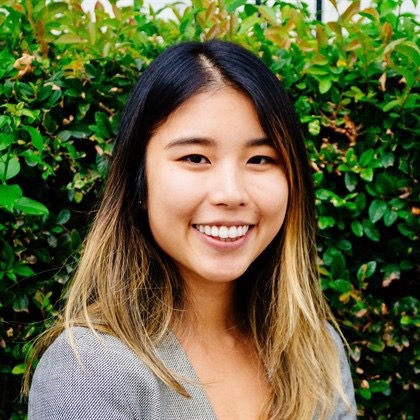Tiffany Wu, a 2023 graduate of Columbia University’s MPA in Environmental Science and Policy program, is a senior program associate at Winrock International, which provides solutions to complex social and agricultural challenges worldwide. Wu works on climate and sustainability projects spanning carbon markets, corporate greenhouse gas accounting and clean energy.

Drawing on her diverse experiences in field research, as well as her background in corporate and nonprofit roles, Wu bridges science, policy and strategy to help organizations take meaningful climate action. In the Q&A below, Wu speaks about her career path, the lessons she learned at Columbia and her advice for students entering the field.
Can you tell us about your current work?
I’m a senior program associate at Winrock International on the Net Zero Climate Services team. I just hit my one-year mark here!
I work on a variety of projects—some related to energy, others to the voluntary carbon market or corporate greenhouse gas accounting. I spend a lot of time reading and understanding the landscape of standards and guidance, like the Science Based Targets initiative and the Greenhouse Gas Protocol.
It’s been really rewarding to work across so many areas. I also get to see the day-to-day details of nonprofit work, including proposal writing and putting together grants and contracts. In a nonprofit, you’re exposed to all parts of the process, whereas in corporate settings those responsibilities are usually handled by separate, specialized teams.
You’ve worked in corporate, nonprofit and public-sector roles. How did you navigate those different workspaces?
At Columbia, I worked on projects related to the Global Reporting Initiative and the Inflation Reduction Act through my courses—the Corporate Sustainability Reporting class (SUMA 5025) and the capstone project. Those gave me experience in corporate and public-sector contexts.
Before grad school, I also worked in corporate, nonprofit and academic roles. Each has its own rhythm. Corporate tends to move faster, but sustainability efforts there require a lot of buy-in from senior leadership, and sustainability managers spend a lot of time persuading executives.
Nonprofits are much more hands-on. Everyone’s committed to the mission, but you’re often pulled into projects outside your comfort zone and expected to learn quickly. That reminds me of grad school, actually, because you’re constantly learning and adjusting.
Academia was similar to nonprofit work in some ways. When I was working in the forest with spotted owls, everyone was deeply passionate about science and fieldwork. But there’s also a lot of red tape and funding constraints to navigate.
How did your fieldwork with spotted owls influence your perspective on environmental policy?
That experience was really formative for me. Fieldwork is tough. My schedule was four days a week, working overnight from 6 p.m. to 3 a.m., hiking through the forest in the dark and conducting occupancy and reproductive surveys. It was grueling but also extremely rewarding.
We were studying California spotted owls, which are protected under the state’s Endangered Species Act. Every time we confirmed a nesting pair, that area of the forest would not be sold off by the U.S. Forest Service and would remain protected. I loved seeing the direct connection between the research we were doing on the ground and the policy decisions being made to conserve habitats.
That work showed me how policy and science reinforce each other. Scientists were collecting data to understand how much habitat owls needed to reproduce successfully, and that evidence shaped policy decisions to keep the species viable. At the same time, it was clear that the policy framework created the incentive to carry out that research and enforce protections.
Seeing how your own work in the field could directly influence the survival of an endangered species really inspired me to pursue the MPA-ESP program. It also helped me realize that, as much as I enjoyed fieldwork, it wasn’t sustainable for me long-term. I wanted to move into roles where I could help bridge that gap between science and policy.
Was there a project at Columbia that felt especially meaningful?
The capstone was probably the most impactful. My team worked with C40 Cities on how U.S. cities could implement the Inflation Reduction Act, which was very new at the time. There wasn’t much policy analysis on it yet, and it was exciting to take this big, complex piece of legislation and figure out how to make it actionable for cities.
I also learned a lot about teamwork, since we were working in a group of 10 while juggling other classes, job applications and everything else going on in the spring semester.
Corporate Sustainability Reporting and Strategy also solidified my interest in corporate sustainability and gave me hands-on experience I still use today.
What advice would you give to current ESP students?
I’d encourage students to talk to as many people in the sustainability space as possible, not necessarily to get a job, but to learn how different roles and organizations fit into the bigger picture.
There are so many jobs in sustainability that you may not even know exist. Approach those conversations with curiosity and an open mind.
Remember that you’re not alone if the job search takes longer than expected. It took me a year to find the right fit after graduating, and it was a tough time. But it’s worth it. People choose this field because they care about making the world better, even if the path isn’t always easy.
Are there any upcoming projects you’re excited about?
We’re working on the Corporate Climate Contribution Index, which is an initiative to develop an index that provides investors and the public with a more nuanced understanding of which companies are leaders in how they contribute to global greenhouse gas emissions-cutting efforts by weighing various indicators of effort and achievement.


